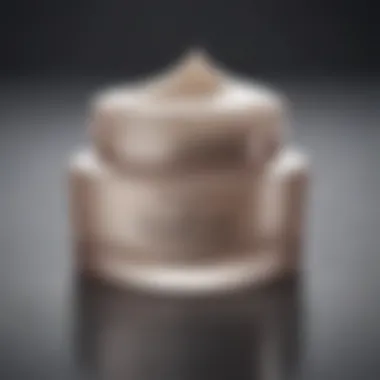Top Night Moisturizers for Acne-Prone Skin


Intro
Skincare is a vital part of many people’s daily routines. For those with acne-prone skin, finding an effective night time moisturizer can seem difficult. The skin has unique needs, especially during the night when it performs crucial repair processes. A good nighttime product can aid in moisture retention while simultaneously helping to control excess oil. This is especially important for individuals who deal with frequent breakouts and skin irritations.
Acne-prone skin requires special attention. Using thick creams can sometimes clog pores, but not moisturizing at all can worsen the condition. Thus, selecting the right night moisturizer becomes essential. This article will explore various ingredients that are beneficial for acne-prone skin, alongside practical recommendations. It will also address common questions about these products.
Importance of Nighttime Skincare
The nighttime routine is possibly the most crucial aspect of a skincare regimen. During sleep, the body rejuvenates and repairs skin cells. This is an optimal time for targeted treatments and moisturization.
- During this time, the skin's permeability increases, allowing better absorption of beneficial ingredients.
- Certain ingredients like hyaluronic acid, niacinamide, and salicylic acid can provide hydration, anti-inflammatory effects, and reduced oiliness.
Choosing the right products can enhance healing and help reduce the chances of future breakouts.
Key Ingredients to Look For
Not every moisturizer is made alike. Here are some ingredients to seek:
- Hyaluronic acid: Draws moisture into the skin without feeling heavy.
- Niacinamide: Regulates oil production and enhances the skin barrier.
- Salicylic Acid: Helps to unclog pores, reducing the risk of acne.
- Glycolic Acid: Exfoliates dead skin cells, improving skin texture.
- Tea Tree Oil: Known for its antibacterial properties, it helps combat acne.
These ingredients can help maintain a delicate balance while addressing issues specific to acne-prone skin.
Recommended Nighttime Moisturizers
- CeraVe PM Facial Moisturizing Lotion – Contains ceramides, niacinamide, and hyaluronic acid.
- Neutrogena Hydro Boost Gel-Cream – Hyaluronic acid hydrates, good for oily skin.
- La Roche-Posay Effaclar Mat – Controls shine while providing hydration.
- Bioderma Sebium Hydra – Moisturizes while balancing oily skin, preventing irritation.
Reviews indicate that these products effectively strike a balance without leading to breakouts.
Selecting the right moisturizer involves trial and error. Keep notes on how your skin reacts to find the best match.
Ending
Finding a suitable nighttime moisturizer can promote healthier skin by providing necessary hydration while avoiding ingredients that may induce breakouts. Understanding the importance of ingredients tailored for acne-prone skin can lead to making informed choices. By choosing properly, you can help support your skin during its most restorative hours.
Understanding Acne Prone Skin
Understanding acne prone skin is crucial for developing effective nighttime skincare routines. This section delves into the specific characteristics of acne prone skin, the common causes behind its occurrence, and emphasizes the importance of moisturization for maintaining skin health. By comprehending these elements, individuals can make informed decisions about products that suit their skin’s unique needs.
Characteristics of Acne Prone Skin
Acne prone skin often indicates an imbalance in oil production and cellular turnover. Some characteristic features include:
- Oily skin: Increased sebum production can clog pores.
- Frequent breakouts: These can range from mild blemishes to severe cystic acne.
- Sensitivity: Many with acne prone skin may experience redness or irritation from certain products.
- Enlarged pores: Clogged pores can appear visibly larger and contribute to an uneven texture.
Recognizing these characteristics helps in selecting appropriate moisturizers that won’t exacerbate these symptoms. Products aimed specifically at oily skin can assist in controlling excess oil while providing hydration.
Common Causes of Acne
Acne can arise from a variety of factors, which can vary from hormonal changes to environmental influences. The common causes include:
- Hormonal fluctuations: These are particularly prevalent during puberty, menstruation, or pregnancy.
- Diet: Consuming excessive sugars and dairy may trigger breakouts in some people.
- Stress: Elevated stress levels can lead to hormonal imbalances, resulting in increased acne.
- Comedogenic products: Using skincare or makeup that clogs pores can worsen the situation.
Understanding these causes enables individuals to take proactive measures. This might include lifestyle changes, ingredient awareness, and choosing products formulated for acne prone skin.


The Importance of Moisturization
Moisturization is often misunderstood in skincare routines for acne prone individuals. Some believe that oily skin does not require additional moisture; however, this is a misconception. Maintaining hydration is essential for the skin's overall health. Here’s why moisturization is vital:
- Balancing oil production: When the skin is properly hydrated, it may produce less sebum, which helps prevent clogging of the pores.
- Enhancing skin barrier function: A well-moisturized skin barrier is better equipped to ward off external irritants and bacteria.
- Promoting healing: Ingredients that hydrate can also aid in reducing the appearance of post-acne scars and improving skin texture over time.
"Moisturizing the skin properly can help control acne rather than worsen it."
The Role of Night Time Skincare
Night time skincare plays a critical role in maintaining skin health, particularly for those with acne-prone skin. While daytime routines often focus on protection and oil control, the night presents a unique opportunity for regeneration and repair. Skin undergoes various beneficial processes during sleep. Understanding these processes clarifies why incorporating a specific night time moisturizer is essential for managing acne effectively.
How Skin Repairs Overnight
During the night, the skin enters a phase focused on healing and renewal. The body ramps up its cellular repair mechanisms while we sleep. Increased blood flow delivers essential nutrients, which can enhance skin texture and tone. Moreover, the skin's barrier function becomes more active at night, which aids in retaining moisture and combating dehydration. This regeneration is crucial for acne-prone skin, where imbalance between oil production and hydration often leads to breakouts.
Additionally, the skin produces significantly more collagen at night. Collagen is vital to maintaining skin elasticity and is instrumental in healing acne scars. The process of cell turnover also heightens, where dead skin cells are shed and replaced with new ones. This action is particularly relevant, as it prevents clogged pores, one of the leading causes of acne.
Why Choose a Night Time Moisturizer
Selecting a night time moisturizer designed for acne-prone skin is critical for several reasons. Firstly, these products are often formulated with specific active ingredients that support skin healing overnight. They usually contain hydrating components that provide essential moisture without clogging pores. In addition, they may feature acne-fighting agents, such as salicylic acid, that work best when applied during the night, allowing the skin to absorb their benefits without the interference of makeup or environmental factors.
Another significant benefit of night time moisturizers is that they can help maintain an ideal skin pH. Acne can thrive in unbalanced environments, so using a moisturizer designed for night time application helps support skin's natural defenses, making it easier to combat breakouts while enhancing overall skin hydration.
Key Ingredients in Night Time Moisturizers
Choosing the right night time moisturizer is critical for individuals with acne-prone skin. The right ingredients can make a significant difference in achieving clear, healthy skin. Night moisturizers should hydrate without clogging pores, fight acne, and soothe inflammation. Understanding key ingredients helps consumers make informed choices, ensuring that their skincare routine supports their skin's unique needs.
Hydrating Ingredients
Hyaluronic Acid
Hyaluronic Acid is a powerful humectant known for its ability to retain moisture. It can hold up to 1,000 times its weight in water, making it excellent for keeping skin hydrated throughout the night. The key characteristic of Hyaluronic Acid is its lightweight nature. Unlike some heavier moisturizers, it does not suffocate the skin, which is important for those prone to breakouts.
One unique feature is its ability to provide hydration without adding oil, which is beneficial for acne-prone skin. However, it is essential to apply it correctly; using it on damp skin can enhance its effects. On the downside, if used improperly, it may lead to dehydration in excessively dry environments.
Glycerin
Glycerin is another effective moisturizer. Like Hyaluronic Acid, it is a humectant. Glycerin draws water to the skin, ensuring optimal hydration. Its key characteristic is its versatility; it works well with various skin types and formulations. This makes glycerin a popular choice for night moisturizers targeting acne-prone skin.
A unique aspect of glycerin is its capability for gentle exfoliation, which aids in cell turnover. This can help prevent clogged pores. A potential disadvantage is that it can feel slightly sticky for some users, but this is often outweighed by its hydrating benefits.
Acne Fighting Ingredients
Salicylic Acid
Salicylic Acid is renowned for its effectiveness in treating acne. It penetrates deep into pores, dissolving excess sebum and dead skin cells. This unique ability makes it a staple in acne treatment products. The key feature of Salicylic Acid is its anti-inflammatory properties, which help reduce redness and swelling associated with breakouts.
Moreover, this ingredient is beneficial because it can prevent future outbreaks. However, strong concentrations may cause dryness or irritation to sensitive skin. Thus, careful selection and application are necessary for optimal results.
Niacinamide
Niacinamide, a form of Vitamin B3, is praised for its multifunctional benefits. It helps improve skin barrier function, retaining moisture while also regulating oil production. This is particularly valued by those with acne-prone skin. Its key characteristic is the reduction of inflammation, leading to calmer skin.


Niacinamide is beneficial as it helps fade post-acne marks and improves overall skin tone. Its unique feature is the ability to enhance the efficacy of other active ingredients in a product. However, some may experience mild irritation, especially at higher concentrations, making patch testing important.
Soothing Ingredients
Aloe Vera
Aloe Vera is widely recognized for its soothing and healing properties. It contains vitamins, antioxidants, and anti-inflammatory components that make it a great addition to any night time moisturizer. Its key characteristic is its ability to calm irritation and reduce redness, making it essential for acne-prone skin.
One of the unique features of Aloe Vera is its cooling effect, which can be particularly comforting after applying active treatments. While beneficial, some formulations may vary in purity, so it’s essential to choose products that have a high concentration of natural Aloe Vera.
Green Tea Extract
Green Tea Extract offers potent antioxidant protection for the skin. It contains polyphenols, which are anti-inflammatory and can help reduce acne-related redness. The key characteristic of Green Tea Extract is its ability to fight free radicals, contributing to healthier skin.
This ingredient is advantageous as it also possesses antibacterial properties, which can help in preventing acne. Its unique feature is that it can enhance overall skin tone while offering soothing effects. However, sensitivity in some individuals can occur, so it is wise to test formulations containing this extract.
Choosing the Right Night Time Moisturizer
Choosing an appropriate night time moisturizer is crucial for individuals with acne prone skin. This is not merely about picking any moisturizer off the shelf. It involves understanding the specific needs of your skin. The right product can help maintain hydration while managing excess oil and preventing breakouts. An effective moisturizer can provide a balance between nurturing the skin and avoiding pore blockage, which is essential for acne prone types.
Identifying Skin Type
Sensitive Skin
Sensitive skin presents unique challenges when selecting skincare products. Its reactive nature means that it can easily become irritated by harsh ingredients common in some moisturizers. This skin type typically has a compromised barrier, making it more susceptible to redness, dryness, and flakiness. For those searching for a night time moisturizer, it is essential to avoid products with strong fragrances or irritants.
Sensitive skin can benefit from moisturizers containing soothing ingredients like chamomile or calendula, which help calm irritation. Many consumers with this skin type prefer formulations with minimal ingredients to reduce the risk of adverse reactions. However, the challenge lies in the risk of under-moisturizing. Sensitive skin can still be oily or dehydrated, so finding a product that hydrates without feeling heavy is key.
Oily Skin
Oily skin is characterized by excess sebum production, often leading to clogged pores and breakouts. When choosing a night time moisturizer, individuals with oily skin should look for non-comedogenic options. These products do not clog pores and can help control shine without stripping the skin of necessary moisture. A light, gel-like texture is often preferred, as it provides hydration without the greasy feel.
The unique feature of oily skin is its inclination to withstand harsher ingredients, leading to effective acne treatment. However, it's crucial not to over-dry this skin type, as excessive dryness can trigger more oil production. Key ingredients that can assist oily skin types include salicylic acid and niacinamide, which help regulate oil and reduce inflammation.
Understanding Labels and Claims
Navigating through the myriad of labels and claims on skincare products can be daunting. Many moisturizers claim to be specifically formulated for acne prone skin, however, it's important to scrutinize each claim carefully. Look for terms such as "non-comedogenic," which indicates that the product will not clog pores. Furthermore, phrases like "dermatologist-tested" can add a level of trust, indicating the product has been evaluated by skincare professionals.
Additionally, consumers should pay attention to the ingredient list. Ingredients should be listed in descending order of concentration. If beneficial active ingredients like hyaluronic acid or niacinamide appear towards the end of the list, the product likely contains them in negligible amounts. It’s advisable to prioritize products where the key ingredients paradigmatically relate positively to acne concerns.
In understanding labels and claims, consumers become empowered to select products that align with their skincare needs. The right night moisturizer should not only hydrate the skin but also contribute positively to the overall health of acne prone skin.
Top Recommended Night Time Moisturizers
The selection of the right night time moisturizer is essential, especially for individuals with acne-prone skin. These moisturizers not only provide hydration but also contribute to healing and preventing breakouts. It is crucial to focus on products that contain beneficial ingredients while avoiding those that may clog pores or cause irritation. When choosing a moisturizer, consider texture, specific skin concerns, and individual ingredient tolerance. Here, we delve into two highly recommended products, their unique features, and overall benefits.
Product Reviews and Comparisons
Product A: Key features and benefits
One notable product is Neutrogena Hydro Boost Gel-Cream. This gel-cream is known for its lightweight and non-comedogenic formula, making it suitable for oily and acne-prone skin. It features hyaluronic acid as its primary ingredient, which provides intense hydration without leaving a greasy residue. Users often highlight its ability to keep skin moist all night long without exacerbating their acne condition.
A unique characteristic of this product is its oil-free formulation, which helps in maintaining a proper moisture balance while preventing excess shine. While many find it a highly effective daily moisturizer, those with extremely dry skin might need additional hydration.


Product B: Key features and benefits
Another excellent option is CeraVe PM Facial Moisturizing Lotion. This product stands out due to its inclusion of niacinamide, which can help minimize pores and alleviate redness. The presence of ceramides also aids in restoring the skin barrier, making it less prone to irritants and promoting overall skin health.
A defining feature of CeraVe is its controlled-release technology, which ensures that moisture is distributed throughout the night. This formulation allows the product to be effective in maintaining hydration while not feeling heavy or clogging pores. However, individuals who prefer a lighter texture might find this lotion slightly creamy, needing time to absorb fully.
Budget-Friendly Options
There are several budget-friendly options in the market. Products such as The Ordinary Natural Moisturizing Factors + HA offer excellent hydration without breaking the bank. This lotion includes multiple amino acids, fatty acids, and hyaluronic acid, taking care of the skin’s hydration needs efficiently and affordably.
Luxury Options
On the higher end, consider Drunk Elephant A-Passioni Retinol Cream. This luxurious cream not only hydrates but also promotes cell turnover, aiming to reduce the appearance of acne scars. With a combination of retinol and a blend of nourishing oils, it addresses multiple skin concerns effectively.
Incorporating Night Time Moisturizers into Routine
Incorporating a night time moisturizer into a skincare routine is essential, especially for those with acne prone skin. Unlike daytime products, which often focus on protection and oil control, night time moisturizers are designed to support the skin's natural repair process during sleep. When applied correctly, they can replenish moisture, enhance skin texture, and minimize the appearance of breakouts. Choosing the right product becomes even more important. It is vital to consider how it interacts with other treatments aimed at acne.
Step-by-step Application
Applying a night time moisturizer properly can ensure optimal results. Here’s a simple step-by-step guide:
- Cleansing: Begin with a gentle cleanser suitable for acne prone skin. This will remove dirt, oil, and any makeup, allowing the moisturizer to absorb better.
- Toning (optional): If you use a toner, apply it after cleansing. A toner can help balance the skin’s pH and prep it for further products.
- Treatment Products: If you use any acne treatment products, such as a salicylic acid spot treatment, apply them before your moisturizer. This ensures they penetrate effectively.
- Moisturizer: Take a small amount of the night time moisturizer. Gently apply it to your face using upward motions. Focus on areas that are particularly dry or tend to break out.
- Eye Cream (optional): If you have an eye cream, apply it next. The skin around the eyes is delicate, and this ensures hydration in that area too.
Following these steps can improve the efficacy of your skincare routine.
Adjusting Routines for Acne Treatment
To maximize the benefits of a night time moisturizer while treating acne, it may be helpful to adjust your routine. This ensures that products complement rather than counteract each other. Consider the following points:
- Evaluate Active Ingredients: Be aware of the active ingredients in both acne treatments and moisturizers. For instance, using a product with retinol in conjunction with a heavy occlusive may not be ideal. In contrast, a lightweight, non-comedogenic formula can work well.
- Frequency of Application: If your skin is particularly sensitive or if you introduce new products, start slowly. Begin by using the moisturizer every other night. This allows your skin to adjust to the changes.
- Monitor Skin Response: Pay attention to how your skin reacts. If excessive dryness occurs, reassess the amount or type of moisturizer used. It’s essential for the products to offer balance, so adjusting the quantities might be necessary.
- Stay Consistent: Consistency is crucial in skincare routines. Stick to the schedule established and allow time for the products to show results. Often, it takes several weeks to see noticeable changes in skin appearance and texture.
By following these guidelines, one can effectively incorporate a night time moisturizer into their existing acne treatment regimen, addressing hydration needs efficiently.
Common Myths About Moisturizers and Acne
Understanding the misconceptions surrounding moisturizers is crucial for anyone dealing with acne-prone skin. Many individuals mistakenly believe that using a moisturizer will exacerbate their acne. This notion can hinder proper skincare practices. In reality, moisture is essential for maintaining skin health, even for those with oily or acne-prone skin. By addressing these myths, we empower readers to make informed choices that can significantly improve their skin's condition.
Debunking Misconceptions
Numerous myths exist regarding moisturizers and their relation to acne. Here, we clarify some prevalent ideas:
- Myth: Moisturizers Cause Breakouts
Many think that applying any moisturizer leads to clogged pores and resultant breakouts. While some heavy formulations can indeed block pores, not all moisturizers have this effect. Choosing non-comedogenic products specifically formulated for acne-prone skin can actually help maintain hydration without contributing to breakouts. - Myth: Oily Skin Doesn't Need Moisturizer
Another common misconception is that oily skin does not require moisturizing. In fact, oily skin can also be dehydrated, leading the body to produce even more oil as a defense mechanism. A lightweight, oil-free moisturizer can help balance skin, preventing overproduction of sebum and reducing the likelihood of breakouts. - Myth: You Should Avoid All Oils
While it is essential to avoid certain oils known to clog pores, not all oils are harmful. Certain natural oils, like jojoba oil, can mimic the skin's natural sebum and actually aid in regulating oil production. Thus, understanding which oils are beneficial is vital for those seeking to maintain healthy, acne-free skin. - Myth: The More Moisturizer, The Better
Some people believe slathering on excessive moisturizer will yield better results. However, over-application can lead to a greasy feeling and may disrupt the skin's natural balance. A moderate amount, applied twice a day, tends to be sufficient for most skin types. - Myth: The Best Moisturizer Is Always Expensive
Price does not always determine quality. Many drugstore brands offer excellent options for acne-prone skin at reasonable prices. It is essential to focus on the ingredients and their suitability for your specific skin type rather than solely on price.
The Future of Night Time Skincare
As we delve into the future of night time skincare, it’s vital to understand the evolving landscape of skincare formulations and treatments specifically tailored for acne-prone individuals. Advances in technology and a deeper understanding of skin biology have led to innovative approaches. For those grappling with acne, the quest for effective solutions at night becomes even more critical, as this is a time when the skin can heal and renew.
Modern formulations are focusing on multifaceted benefits. They balance hydration, nourishment, and therapeutic action without exacerbating breakouts. Night creams and gels are being revolutionized, incorporating smart ingredients that not only accommodate hydrating needs but also contain acne-fighting properties. This evolution means users can anticipate products that provide deeper penetration of active ingredients, affording more significant results with night time applications.
Considerations for Future Products
- Ingredient Transparency: There will be greater emphasis on transparency regarding ingredient sourcing and formulation. Consumers are increasingly educated about what they apply on their skin.
- Customization: Tailored skincare solutions are likely to be the standard. Brands may begin to offer customizable products based on individual skin concerns, genetics, or environmental factors.
- Sustainability: Eco-friendly and sustainable ingredients are gaining traction. Consumers want products that are not only effective but also responsible, leading brands to innovate in sourcing and packaging.
The future of night time skincare is not just about hydration; it’s about comprehensive care that respects individual needs and the planet.
In light of increasing research and technological advancements, we can expect a rise in clinical-grade ingredients in over-the-counter products. For example, investment in peptides, growth factors, and prebiotics present exciting prospects for enhancing skin barrier function and overall skin health. The synergy between these ingredients will likely pave the way for night creams that do more than just moisturize – they will actively participate in repairing and enhancing skin during sleep.
With a commitment to efficacy and safety, the future promises products with decreased potential for irritation, catering to sensitive and acne-prone skin types. As barriers for entry lower, it will cultivate a landscape rich in options, allowing more individuals to find suitable night time moisturizers that align with their specific skincare needs.
In summary, the future of night time skincare for acne-prone individuals is promising. With innovations that prioritize skin health, targeted action, and individual needs, we can look forward to advancements that not only address existing concerns but also prevent future breakouts, ensuring a healthy, balanced complexion.



